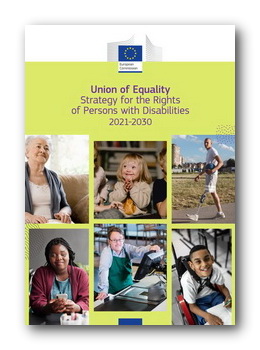 European Commission presented an ambitious Strategy for the Rights of Persons with Disabilities 2021-2030 to ensure their full participation in society, on an equal basis with others in the EU and beyond.
European Commission presented an ambitious Strategy for the Rights of Persons with Disabilities 2021-2030 to ensure their full participation in society, on an equal basis with others in the EU and beyond.
Persons with disabilities have the right to take part in all areas of life, just like everyone else.
Even though the past decades brought progress in access to healthcare, education, employment, recreation activities and participation in political life, many obstacles remain.
It is time to scale up European action.
The new strategy builds on its predecessor, the European Disability Strategy 2010-2020, and contributes to the implementation of the European Pillar of Social Rights for which an Action Plan will be adopted by the Commission this week, which serves as a compass for employment and social policies in Europe.
The strategy supports implementation by the EU and its Member States of the United Nations Convention on the Rights of Persons with Disabilities at both EU and national levels.
Enhancing equal participation and non-discrimination
The ten-year strategy sets out key initiatives around three main themes:
- EU rights: Persons with disabilities have the same right as other EU citizens to move to another country or to participate in political life. Building on the experience of the pilot project ongoing in eight countries, by the end of 2023 the European Commission will propose a European Disability Card for all EU countries that will facilitate mutual recognition of disability status between Member States, helping disabled people enjoy their right of free movement.
- Independent living and autonomy: Persons with disabilities have the right to live independently and choose where and with whom they want to live. To support independent living and inclusion in the community, the Commission will develop guidance and launch an initiative to improve social services for persons with disabilities.
- Non-discrimination and equal opportunities: The strategy aims to protect persons with disabilities from any form of discrimination and violence. It aims to ensure equal opportunities in and access to justice, education, culture, sport and tourism. Equal access must also be guaranteed to all health services and employment.
Background
As announced by President von der Leyen, the Strategy for the Rights of Persons with Disabilities 2021-2030 contributes to building the Union of Equality, together with
- the LGBTIQ Equality Strategy 2020-2025
- the EU Anti-racism Action Plan 2020-2025
- the Gender Equality Strategy 2020-2025
- and the EU Roma Strategic Framework.
The United Nations Convention on the Rights of Persons with Disabilities (UNCRPD), adopted by the UN in 2006, was a breakthrough for the rights of persons with disabilities: all Member States are party to it, and it is the first human rights convention concluded also by the EU.
Parties to the Convention are required to promote, protect and fulfil the human rights of all persons with disabilities and ensure their equality under the law. With this Strategy, the Commission provides the framework supporting EU and Member States’ actions to implement the UNCRPD.
Source: ec.europa.eu
 Government of the Republic of Serbia
Government of the Republic of Serbia















 pdf [271 KB]
pdf [271 KB]
Leave a Comment